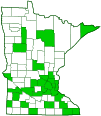Indian blanket
(Gaillardia pulchella var. pulchella)
Conservation • Wetland • Description • Habitat • Ecology • Use • Distribution • Taxonomy
Description |
||
Indian blanket is a showy, easily identified, 4″ to 24″ tall, erect, annual forb that rises from a taproot. The stems are usually erect, sometimes ascending, and usually branched. They are finely ridged and moderately to densely covered with soft, curled hairs. The leaves are alternate, linear, oblong, or spoon-shaped, ⅜″ to 4¾″ long, and ⅛″ to 1⅜″ wide. Lower leaves are on short leaf stalks, middle and upper leaves are stalkless, upper leaves are more or less clasping. The leaf blades may be unlobed or shallowly or deeply lobed (pinnatifid). The upper and lower surfaces are somewhat rough to the touch and are densely covered with short, curled hairs. The margins may be toothed or untoothed and may be wavy. The inflorescence is a solitary flower head on a 1¼″ to 8″ long stalk at the end of the stem and branches. The whorl of bracts at the base of the flower head (involucre) is cup-shaped, 5 ⁄16″ to ⅝″ long, and 11 ⁄16″ to 1⅛″ in diameter. The bracts of the involucre are narrowly triangular and usually fringed with hairs. They are spreading or bent backward at flowering. The flower head is 1″ to 3″ in diameter. There are 8 to 14 ray florets and 40 to 100 or more disk florets. The ray florets are ½″ to 1 3 ⁄16″ long, narrow at the base, broad in the middle, and 3-lobed at the tip. They are reddish to purplish, rarely yellow, from the base to above the middle, yellow or orange at the tip. The outer (lower) surface of the ray florets is hairy. The disk florets are yellowish to purple or brown. The fruit is a dry, one-seeded, 1 ⁄16″ long seed capsule (cypsela). |
||
Height |
||
4″ to 24″ |
||
Flower Color |
||
Reddish to purplish and yellow |
||
Similar Species |
||
Great blanketflower (Gaillardia aristata) is a native perennial. The rays have more yellow—at least the outer half of the ray is yellow or yellow tinged with red. The cypselas are twice as long, ⅛″ to 3 ⁄16″ long. |
||
Habitat |
||
Dry. Full sun. |
||
Ecology |
||
Flowering |
||
May to August |
||
Pests and Diseases |
||
|
||
Use |
||
|
||
Distribution |
||||
|
Sources |
|||
| 5/1/2023 | ||||
Nativity |
||||
Native to Nebraska, Colorado, Montana, Virginia, Florida, and northern Mexico. Introduced. |
||||
Occurrence |
||||
Uncommon, scattered |
||||
Taxonomy |
|||
| Kingdom | Plantae (Plants) | ||
| Subkingdom | Pteridobiotina | ||
| Phylum | Tracheophyta (Vascular Plants) | ||
| Class | Magnoliopsida (Dicots) | ||
Order |
Asterales (Sunflowers, Bellflowers, Fanflowers, and Allies) | ||
Family |
Asteraceae (Sunflowers, Daisies, Asters, and Allies) | ||
| Subfamily | Asteroideae | ||
| Tribe | Helenieae | ||
| Subtribe | Gaillardiinae | ||
| Genus | Gaillardia (blanketflowers) | ||
Subordinate Taxa |
|||
|
|||
Synonyms |
|||
Gaillardia drummondii Gaillardia neomexicana Gaillardia picta Gaillardia pulchella var. australis Gaillardia pulchella var. pict Gaillardia pulchella var. pulchella Gaillardia villosa |
|||
Common Names |
|||
firewheel fire-wheel Indian blanket Indian blanket-flower Indianblanket rosering gaillardia rose-ring blanket-flower rose-ring gaillardia |
|||
Glossary
Clasping
Describing a leaf that wholly or partly surrounds the stem but does not fuse at the base.
Cypsela
A dry, one-chambered, single-seeded seed capsule, formed from a single carpel, with the seed attached to the membranous outer layer (wall) only by the seed stalk; the wall, formed from the wall of the inferior ovary and also from other tissues derived from the receptacle or hypanthium, does not split open at maturity, but relies on decay or predation to release the contents.
Involucre
A whorl of bracts beneath or surrounding a flower, flower head, or flower cluster.
Linear
Long, straight, and narrow, with more or less parallel sides, like a blade of grass.
Pinnatifid
Deeply cut, more than half way to the midrib but not to the midrib, into lobes that are spaced out along the midrib; the lobes do not form separate leaflets.
Visitor Photos |
|||||
Share your photo of this plant. |
|||||
| This button not working for you? Simply email us at info@MinnesotaSeasons.com. Attach one or more photos and, if you like, a caption. |
|||||
|
|||||
MinnesotaSeasons.com Photos |
|||||
Plant |
|||||
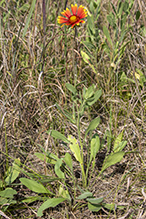 |
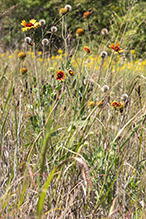 |
||||
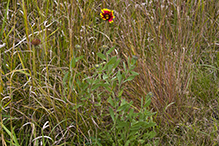 |
|||||
Flower Head |
|||||
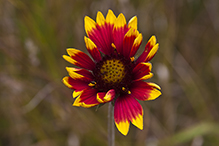 |
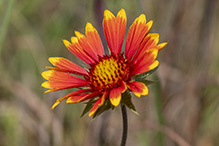 |
||||
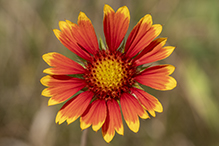 |
|||||
Involucre |
|||||
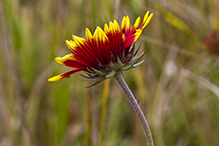 |
|||||
Stem Leaves |
|||||
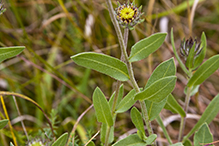 |
|||||
Basal Leaves |
|||||
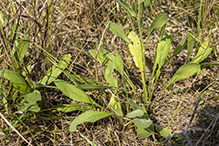 |
|||||
Infructescence |
|||||
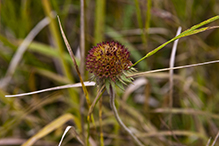 |
|||||

Slideshows |
||
| Blanket Flower DianesDigitals |
||
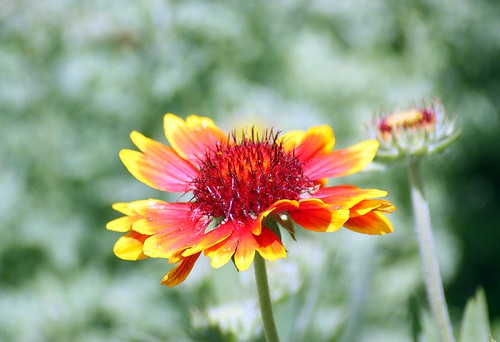
|
||
About
Copyright DianesDigitals |
||
| Gaillardia pulchella (Blanket-Flower) Allen Chartier |
||
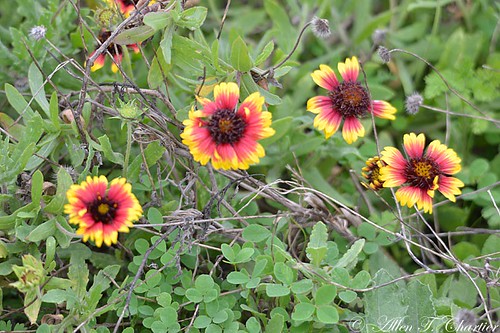
|
||
| Firewheels RangeShots |
||
About
Published on Jul 3, 2013 Gaillardia pulchella: Firewheel, Indian Blanket - Asteraceae (Aster Family) Native to U.S. Firewheel or indian blanket is a popular annual growing 1-2 ft. tall. The hairy stem is usually much-branched and becomes woody at the base late in the season. Branched stems, mostly leafy near the base, have showy flower heads with rays red at base, tipped with yellow, each with 3 teeth at broad end. The well-known flower heads are 1-2 in. across with a red center and a yellow outer band. Occasionally the three-cleft rays are solid orange or yellow. The disk flowers in the center are brownish red. Frequent along roadsides in the Southwest, these wildflowers stand like hundreds of showy Fourth of July pinwheels at the top of slender stalks. Varieties are popular in cultivation, for they tolerate heat and dryness. Among several species in the Southwest, some flowers are entirely yellow. http://www.wildflower.org/plants/result.php?id_plant=GAPU Happy Independence Day! |
||

Visitor Videos |
|||
Share your video of this plant. |
|||
| This button not working for you? Simply email us at info@MinnesotaSeasons.com. Attach a video, a YouTube link, or a cloud storage link. |
|||
Other Videos |
|||
| Gaillardia pulchella Indian Blanket Flower dullard69 |
|||
About
Published on May 30, 2013 An attractive member of the daisy family. It is very salt tolerant and will take dry conditions. |
|||
| PlayMemories. Indian Blanket. Texas wildflowers. Bloggie78660 |
|||
About
Published on May 12, 2013 Gaillardia pulchella (Firewheel, Indian blanket, Indian Blanketflower, or Sundance). Texas wildflowers. Gilleland Creek Trail. May 12, 2013. Indian blanket is commonly used in roadside & meadow plantings, tolerates heat and dryness. Oklahoma designated Indian Blanket as the official state wildflower in 1986. Also called firewheel, the Indian blanket flower is a symbol of Oklahoma's scenic beauty as well as the state's Indian heritage. Kiowa considered it good luck. Sony DSC-HX20V. 20x Optical Zoom. |
|||

Visitor Sightings |
|||||
Report a sighting of this plant. |
|||||
| This button not working for you? Simply email us at info@MinnesotaSeasons.com. Be sure to include a location. |
|||||
|
|||||
MinnesotaSeasons.com Sightings |
|||||

|
Created: Last Updated: © MinnesotaSeasons.com. All rights reserved. |
